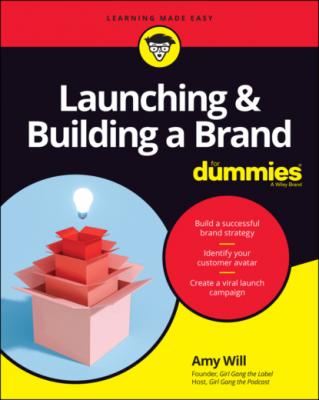Launching & Building a Brand For Dummies. Amy Will
Чтение книги онлайн.
Читать онлайн книгу Launching & Building a Brand For Dummies - Amy Will страница 25
 constantly being inundated with advertisements and offers, so your brand name needs to stand out. Choosing a brand name is one of the most important branding decisions you’ll ever make.
constantly being inundated with advertisements and offers, so your brand name needs to stand out. Choosing a brand name is one of the most important branding decisions you’ll ever make.
Maybe you have a brand name in mind; maybe you don’t. Either way, work through the brand-naming process described in this section. If you don’t have a name in mind, this process will stimulate your creativity. If you already have a name in mind, this process will put it to the test and perhaps even lead you to a much better name.
The process of naming your brand can influence your decisions about brand positioning and identity; it can elevate your concept of the brand and its mission and values. Outdoor Voices, an athleisure brand, was inspired by adults encouraging children to use their “inside voices.” Outdoor Voices encourages the opposite. Its mission is “to get the world moving” with active wear for both indoor and outdoor recreation. The brand targets teens and adults who want to step outside their comfort zones.
Following brand naming parameters
Before you start thinking about naming your brand, be aware of the following characteristics of a good brand name:
Positions your brand advantageously
Clearly communicates your brand’s identity
Reflects your brand’s promise or offerings
Is easy to say and spell
Is unique — available to trademark and available as a domain name (for use as a website address and part of your email address)
Is memorable and concise
Accommodates future expansion
Is consistent with your chosen brand architecture — a branded house or a house of brands (see Chapter 1)
Here are a few examples of descriptive brand names to use as inspiration:
AutoZone vehicle parts and supplies
Energizer batteries
Drano drain opener
Mr. Clean household cleaner
Ziploc storage bags
Windex glass cleaner
Dairy Queen ice cream
Brainstorming brand names
Brainstorming is a creative activity in which you suspend critical thinking and give your right brain free rein. It’s generally a group activity involving several team members gathered in a conference room with a whiteboard and markers, calling out and jotting down ideas that pop into their heads.
I encourage you to take the same approach, alone or with others, to come up with a long list of possible brand names. Suspend your critical mind, and jot down any brand names that pop into your head or the heads of other participants. There should be no criticizing, ignoring, scoffing at, or crossing off any ideas.
Choosing the best brand name
When you have a long list of brand-name candidates, narrow it down to three to five names. At this point, you switch from right-brain (creative) mode to left-brain (critical) mode.
You can start by crossing obviously lousy names off the list, but as you cut more names, competition for the top spot stiffens. Evaluate the remaining names based on the criteria presented in the earlier section “Following brand naming parameters.”
When only a few brand name candidates remain, you can debate the merits of each in the hopes of narrowing the list further. If that approach doesn’t work, you may want to engage in another brainstorming session.
Chapter 4
Clarifying Your Branding Goals
IN THIS CHAPTER
One of the biggest mistakes people make when they start branding is that they start branding. I know that sounds odd, but my point is that most people start by creating a website or blog or podcast before they have any idea of what they’re trying to accomplish. As a result, they work too hard at it, everything they do has little or no impact, they have nothing in place to figure out why, and they begin to wonder what they’re doing wrong. What they did wrong is that they started branding when they should have started planning.
As Steven Covey, author of the best-seller The 7 Habits of Highly Effective People, advises, “Start with the end in mind.” After all, how can you hope to get where you’re going if you don’t even know where that is?
In this chapter, I encourage you and guide you through the process of starting with the end in mind by establishing branding